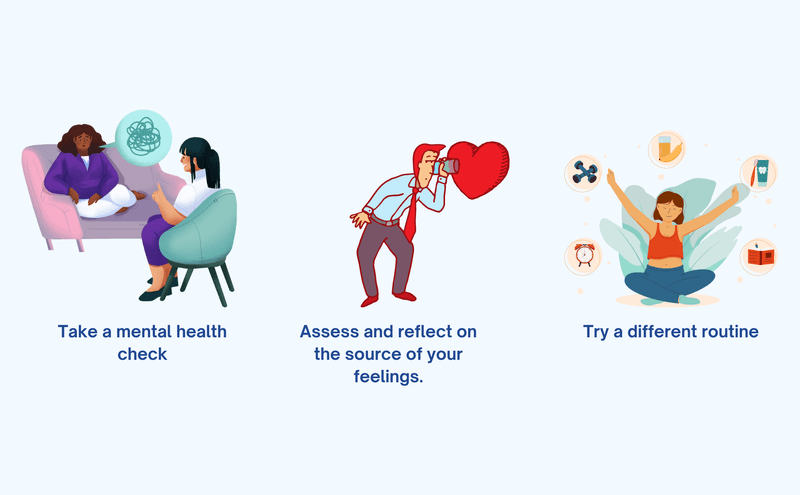There are some days when we wake up not feeling up to it. The first thought that comes to mind on such days is – “I don’t want to work”. We at Totempool empathize with you completely. So, to help you and provide a few genuine solutions, we decided to make this topic our latest article. Here, we will look to provide solutions that help raise employee morale and productivity at the workplace.
It is okay to want to miss work every once in a while. However, it is a major red flag if you don’t want to always show up at work. This could be due to several reasons. You could be feeling low or simply uninterested. In these cases, you must step back and reassess your situation.
Before we go a little further, let’s see what this article is about double-checking the main topics we will discuss:
- I Don’t Want To Work Anymore!
- Is it Common When People Don’t Want To Work?
- What To Do When You Don’t Want To Work?
- Should I Go To Work Today?

I Don’t Want To Work Anymore!
Have you ever felt like all you do is work anymore and that it’s taking over your life? If so, you’re not alone. Everyone feels bogged down by the routine of a job at some point or another. But if the “work blues” are starting to feel more like a never-ending cycle, it may be time to take action and get yourself out of this rut.
You may hear yourself saying these most common phrases:
I dont wanna work
I dont want to work anymore
I hate going to work
I dont want a career
Why do i hate work?
I don’t want to do this
I don’t care about my job
I can’t work
I don’t feel like working
I don’t want to work anymore but i need the money
I don’t want to work for the rest of my life
I don’t feel like working
It can be intimidating to step out of your comfort zone and turn away from working altogether. But don’t worry – there are plenty of ways for you to move on without compromising your lifestyle.
From taking up hobbies that make you happy to rolling up your sleeves and starting a business venture, there are countless paths in front of you if you decide that “I don’t want to work anymore!
Is it Common When People Don’t Want To Work?
Many of us have probably experienced a moment in our lives where we just don’t want to work anymore. We feel defeated and exhausted, like every day is the same routine of going from one task to the next, with no end in sight. But does this feeling mean that it’s common for people not to want to work?
The answer is yes, absolutely! It’s normal for people not to feel like working anymore – especially during times of stress or when faced with seemingly insurmountable challenges. Everyone needs a break occasionally, especially if their job involves long hours and challenging problems. Taking some time off can help rejuvenate you and give you the strength and motivation to face your responsibilities head-on again.
What To Do When You Don’t Want To Work?

When you don’t feel like working, you need to either look for a career change, or the situation might require a shift in mindset. Following these tips can be your first step in that direction.
1) Take A Mental Health Check
“Self-care is never a selfish act—it is simply good stewardship of the only gift I have, the gift I was put on earth to offer to others.”
— Parker Palmer
When you’re feeling tired, stressed, or depressed, you might stop enjoying things that once made you happy. You could find yourself feeling apathetic or demotivated towards your job. It could signify that you need some time away from work to rest and recharge.
If you need help sorting through your feelings, consider speaking to someone like a trusted friend or family member. This is because they might be able to advise you on how to deal with stress at work. If not, your friends and family can always support you through the situation.
2) Assess And Reflect On The Source Of Your Feelings
If your job has just started making you unhappy suddenly, ask yourself if anything has changed at work lately.
Are there more people around who make you uncomfortable? Do you feel more pressure to perform? Have your hours been cut? Has someone been bothering or bullying you? These could all be contributing factors to why your emotions are in an uproar.
Additionally, it could be issues such as a taxing commute or a toxic work environment. There are quite a few ways to resolve the problems stated above. You can opt for a change of department within the organization. Also, you could look for a new job.
This new opportunity can allow for work from home, or maybe they are just closer to your place. Perhaps, they might give you the option of flexible working.
3) Try A Different Routine
Routines are extremely helpful, and they can also be restrictive.
Who hasn’t woken up groggy from the alarm clock, dreading the thought of having to put on your work clothes and head out into traffic to slog through a day in a job you don’t love?
When you find yourself in this situation, one of the most effective things you can do to make your mornings more manageable is to break up your routine. You would have time to do different activities by waking up earlier before work. Also, this will make you feel you have at least some control over the day ahead.
In the morning, you might walk, run, read a book, watch TV, or simply meditate. All of these activities can help you feel calmer and more focused. They will also make you more confident as you head out into the day.
Definitely give it a try. You’ll see that once you start changing your routine, you may never want to go back!

The above tips did not work for you. Stop fretting. We have more hacks that can drive away the ‘I don’t want to work feeling.’
4) Leave Work At The Office
It’s hard to let go of work when you’re so deeply entrenched in it. It can be even more difficult when you have a big project or your plate is full.
Since we have smartphones with us all the time, it’s easy to slip into that “just one more email” mentality, especially if we’re waiting on someone else to get back to us or if it just seems like there will be a lot of extra work in the morning if we don’t take care of it now.
But instead of letting yourself get caught up in the “just-one-more-email” cycle, try to put work out of your mind as much as possible after hours. If that means locking your smartphone away in a drawer so you won’t be tempted to respond to emails, go ahead and do it. Whatever it is can wait until tomorrow.
Remember that everyone else has gone home for the day. So, there is nothing anyone can do but wait until tomorrow. It may take a little bit more planning and effort than usual. But it’s worth it. Leave work at work when you go home. This will help you relax and help prevent burnout.
For example, if there’s a big project due in two weeks, you know there will probably be some late nights ahead of you. So, plan what time you’ll leave work in the evening. This will give you enough time to unwind before starting work on that next major project.
5) Have A Reward System In Place
If you’re struggling with not wanting to go to work, finding a reward system that will work for you can be helpful. One option is to give yourself a treat after work or at the end of the week. This can be something small like a cupcake or an extra hour of watching Netflix.
Another option is to do something you enjoy during the workday. This might be rewarding in its own right and could make your job more interesting. Also, this would make it easier to get through the day.
Whatever you choose, ensure you’re still being productive while rewarding yourself. Don’t spend all day watching funny cat videos while your boss thinks you’re working hard!
6) Learn To Say No
It’s tough to find a happy medium between work and life. Knowing when to say no can be a challenge. However, you can do it if you take the time to evaluate your priorities at home and work.
Chances are, you’re working too hard because you feel that you have to. Sometimes we’re so stressed that we don’t think straight or consider our options. This makes it easier for others to manipulate us into doing whatever they want.
This is why it’s so important to evaluate your priorities. Otherwise, you might end up saying yes more often than necessary.
7) You Struggle To Start With A Task. Ask For Help!
Getting started on a big task or challenging project is the hardest part. We’ve all heard that saying before, right? Well, it’s true. And it can be frustrating when you are expected to tackle a task you’d instead not do.
The problem is, sometimes, we just don’t know where to start. We might be overwhelmed with ideas. Or, we might not feel like we have the resources to do what we need. Or maybe we don’t even know how to begin.
It can be hard to brainstorm an angle for something if you don’t have any ideas!
At the end of the day, there are many ways to overcome this procrastination. However, the one thing that always helps is asking for help. If you don’t know the answer, ask someone else. And If you don’t understand something, ask someone who does.
If you are having trouble getting started because you don’t have time, money, or resources, ask someone else for those things instead of figuring out how to make them from scratch. You get the gist.

We have covered quite a few tips so far. Still saying, “I don’t want to work.” Well, we got you covered with some bonus tips in this section.
8) Consider Other Career Options
You’ve been in the same position for a long time. Your job has become less and less fulfilling. Now it is okay to think about other career options. Also, it is okay to try and make a change.
Besides the obvious benefit of being happier, taking the initiative to find something better for yourself can also help you in other ways. You might wind up with a higher salary or more exciting work. You might finally be able to get out of a job you’ve hated for years.
If your current position is making you unhappy, take some time to consider your transferrable skills and what you could do with them in another industry. Maybe you’ve got experience in human resources that would make you a great candidate for recruiting at a college or university.
Your accounting and money management skills could make you the perfect CFO for an established company. Or they could help you land a role as the head of finance for a nonprofit organization. Or you could use your marketing and public relations skills to start your own business consulting firm or freelance writing business.
You can also look at going back to school. Or attending a training program would qualify you for an entirely different career field than the one you’re currently working in. This could give you new opportunities within your existing company.
9) Take A Break At Regular Intervals
Taking a break can lead to breakthroughs.
― Russell Eric Dobda
Setting boundaries is one of the most important things you can do when you feel overworked. It’s easy to fall into a trap where you’re working too much and taking on more tasks than you can handle.
Your responsibilities pile up, and keeping your eyes on the big picture becomes harder. This is especially true when it comes to the time in which you work. If everything is an emergency, then there’s no time for breaks.
Make sure you’re taking care of yourself and your employees. Set aside time for breaks throughout the day and week. Suppose you have a large enough company that this isn’t feasible; at least try to schedule breaks twice daily or every other day.
Schedule as many days off as possible to take some time off from the office and rest or do fun things rather than continue to work. This will help keep your perspective positive so you don’t lose sight of why you love what you do.
10) Develop A Support System And Talk To Them
A support system is essential as you’re trying to get through a rough period at work. Even if you’re okay with how much you’re getting paid and the work itself. Talking about burnout with people who care about you is still nice.
It can be that extra little bit of motivation you need to get through the last few weeks of your internship or job search. Moreover, it will help you a lot, even in the next few days when you would rather be doing anything but work.
Should I Go To Work Today?
Now it’s time to decide. You have an upcoming shift at work but don’t feel like showing up? You might be tempted to call in sick or take the day off. However, if you’re feeling low and don’t want to go to work today, it’s essential to take time and try creative solutions first.
Taking a break from your job can benefit your mental health and well-being, so it’s essential to find ways of dealing with your emotions that don’t involve avoiding your obligations altogether. It’s recommended not to abandon your work before finding a solution. It can be a new job or just a buddy to talk to. Discuss how you feel with someone close or seek professional help if needed. This can help identify the root cause of why you don’t want to go to work today, which could lead to potential solutions.
In Conclusion

We have compiled a comprehensive set of tips to help you overcome the feeling of not wanting to work. However, if you still say, “I don’t want to work, ” let us summarize the entire article.
Ask yourself why you find yourself bored and uninspired by your work. Sometimes we must step back and reflect on the things that excite us. This will help us get back in the swing of things.
Set boundaries for keeping work out of your personal life. Do things that excite you. Also, remember to take a break now and then. And if you’re constantly feeling depressed and uninspired by your job, it might be time to consider another career path.

Ranu Kumari is a Professional Writer and a Marketing enthusiast who currently runs her own Marketing Consultancy, LatitudeBOX. She has written promotional articles for multiple brands and has published her work in Scopus indexed journals. She is passionate about expressing her thoughts and ideas to connect with her readers in a voice that they understand.
